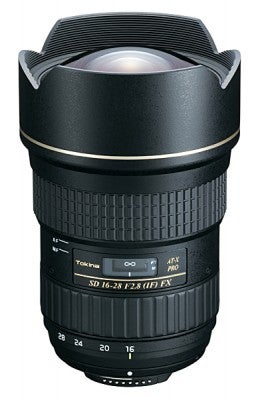Wide-aperture, wideangle zoom lens great for full-frame coverage
Tokina’s AT-X 16-28mm f/2.8 PRO FX Review
Launched at Photokina 2010, Tokina’s AT-X 16-28mm f/2.8 Pro lens is the first of a new generation of lenses that is being specifically designed for use with full-frame professional digital cameras.
It is available only in Nikon and Canon mounts and, as such, goes head-to-head with those manufacturers’ own 16-28mm pro-spec zooms. As it happens, this means going up against either 16-35mm zooms or, in Nikon’s case, the 14-24mm zoom. Both are capable lenses and Tokina has to offer something very special if it’s to be able to hold its head up high.
First impressions are excellent. The lens has a solid feel and is fitted with a rubber weather-resistant seal at the rear. There is a fixed petal-type lens hood at the front, surrounding a bulbous front element, over which slips a rubber lens cap to protect the glass. However, there is no facility for attaching filters.
The focusing ring is foremost and is separated from the zoom ring by a focused-distance window. There is no movement of the focusing ring in AF mode but, by the same token, manual adjustments cannot be applied unless the focusing ring is pulled backwards to engage the clutch mechanism. The push-pull AF/MF switch is exclusive to Tokina’s lenses and is very easy to use.
In AF mode, focusing is both quick and quiet but not silent as Tokina claims. Manual focusing requires less than a quarter-turn to pull-back from infinity to the 0.28m minimum object distance.
The zoom ring is a little stiff and inconveniently placed at the very back of the lens, but this is only a minor niggle.
Image distortion is very nearly non-existent. There is a hint of barrelling at the 16mm setting and just a touch of pincushion distortion at 28mm but so subtly that most users would probably fail to spot them. This high level of geometric image quality, coupled with near-total freedom from chromatic aberrations, can almost certainly be traced to the use of three aspherical profiles and three super-low-dispersion (SD) glass elements.
MTF testing reveals a solid set of curves that only dip slightly below the critical 0.25 cycles-per-pixel level briefly when the lens is used wide-open at its longer focal lengths. Other than that, and especially at the 16mm focal-length setting, the MTF results were excellent.

Verdict
One of the Tokina's obvious advantages is very competitive pricing when pitched against similar lenses from both Canon and Nikon. There is no evidence here to suggest that any corners have been cut along the way and Tokina's zoom therefore deserves serious consideration by anybody who might otherwise have chosen one of the other brands - not least because its overall score puts it very much on a level with its obvious competitors at around half their prices. Equally importantly, this first full-frame Tokina lens bodes very well for other models that will follow. As a result, we should be seeing a lot more Tokina lenses on full-frame digital cameras in the future.





